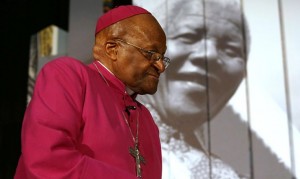The Need to Boycott Fossil Fuel Companies, Not Just Divest from Them
In spring 2014, shortly before a UN report on how carbon emissions need to be cut drastically, Nobel peace prize winner Archbishop Desmond Tutu, one of the Elders with Mary Robinson, called for an anti-apartheid-style boycott and disinvestment campaign against the fossil fuel industry. Archbishop Tutu called for boycotting events, sports teams and media programmes sponsored by fossil-fuel energy companies. But the center of his focus was on disinvestment in the fossil fuel companies, convincing individuals and institutional investors to withdraw their money from fossil fuel companies.
Others, especially Bill McKibben and his 350 organisation, have been pushing the disinvestment campaign since the 2012 US elections, with increasing success: the Rockefellers Brothers Fund ($800 million in assets) has announced that it is divesting from fossil fuel stocks; Glasgow University became the first university in Europe to divest; Stanford University has committed to a divestment of coal stocks; and, many religious organizations have committed to divest. A study at Oxford University indicates that the divestment campaign has grown faster than tobacco and other divestment projects. The logic is simple enough, as articulated by Bill McKibben: “if it’s wrong to wreck the climate, it’s wrong to profit from that wreckage.”
Besides divestment, switching to using renewable energy sources and using less fossil fuels are forms of reducing our reliance on fossil fuels and cutting into the profits of fossil fuel companies. And those actions should be pursued.
But a simple and time-tested method of sending a “price signal” to fossil fuel companies, in absence of a carbon tax, is to engage in a good, old-fashioned boycott where consumers ostracize a fossil fuel bad actor, by refusing to buy any products from them.
As we know, “boycott” means: “To abstain from using, buying, or dealing with, as a protest or means of coercion.’ The American Heritage Dictionary of the English Language.
It’s hard for individual citizens to boycott companies that just drill for, refine, distribute and sell fossil fuels to others, such as large manufacturing or energy companies. It’s also hard to organize a campaign to boycott gasoline, for instance. Almost everybody needs gas to power their vehicles. We could select the worst of the fossil fuel companies — ExxonMobil and BP might qualify — and boycott their retail gas stations.
An easier form of boycotting would be to focus on the non-fuel products sold by some of the fossil fuel companies. For instance, the particularly villainous Koch Brothers in the US, a private company, own Georgia-Pacific, a company that produces and sells a host of consumer goods, including paper, tissues, pulp and related materials. Koch Bros. also own Invista that sells fibers, fabrics, polymers, resins and other materials through brands such as Stainmaster carpeting, Lycra and others. These are all products that can be boycotted.
Having contributed the term “boycott” to the English language, Ireland is the perfect place to start such a campaign. The origin of the term is in the Irish land fights where an estate, owned by the Earl of Erne in County Mayo, and managed by a Capt Boycott, evicted tenants and refused to lower the rents for others. The community ostracized the estate and refused to do work on it, or sell goods to the estate, the mailman even refusing to deliver its mail.
Conclusion
Boycotting works on several levels.
Those who are the target of the boycott, and companies are run by and managed by people, become stigmatized, sometimes even ostracized. Some owners, like the Earl of Erne and Koch Brothers, may enjoy that role but the deeper it cuts into the operations and profits the more it hurts others in the organizations, as well as investors.
Divesting is purely economic and abstract, as it rests on pushing numbers around on tally sheets. Boycotting is personal and direct, each person making a decision not to buy some product(s) and then carrying out that act. At the same time, it unites the individuals in a collective action, with hundreds, thousands, or millions of other individuals, that continues to reinforce individual action. It even helps to create an environmental movement or community
It is time to turn the likes of Exxon Mobil, BP and the Koch Brothers into modern day Capt Boycotts. That original struggle involved a bit of land in County Mayo; this struggle involves the entire earth.
Sources:
Archbishop Desmond Tutu, “We need an apartheid-style boycott to save the planet,” The Guardian (10 April 2014). www.theguardian.com/commentisfree/2014/apr/10/divest-fossil-fuels-climate-change-keystone-xl
Damian Carrington, “Desmond Tutu calls for anti-apartheid style boycott of fossil fuel industry: Nobel peace prize winner calls for organisations to cut ties with industry and for investors to dump fossil fuel stocks,” The Guardian (10 April 2014). www.theguardian.com/environment/2014/apr/10/desmond-tutu-anti-apartheid-style-boycott-fossil-fuel-industry
Bill McKibben, “The Case for Fossil-Fuel Divestment: On the road with the new generation of college activists fighting for the environment,” Rolling Stone (February 2013). www.rollingstone.com/politics/news/the-case-for-fossil-fuel-divestment-20130222
Bill McKibben, “Divest from Fossil Fuels. Now.” Sojourners: Faith in Action for Social Justice (November 2012). sojo.net/magazine/2012/11/divest-fossil-fuels-now
350.org Divest from Fossil Fuels campaign gofossilfree.org/
Tim Dickinson, “Inside the Koch Brothers’ Toxic Empire,” Rolling Stone (24 Sept 2014). www.rollingstone.com/politics/news/inside-the-koch-brothers-toxic-empire-20140924
ieBLOG, “It’s time to label sacks of coal like we do packs of cigarettes: SMOKING KILLS,” irish environment (1 July 2014). www.irishenvironment.com/blog/time-label-sacks-coal-like-packs-cigarettes-smoking-kills/
Editorial Update, 30 Jan 2015:
Darby Minow Smith, “Boycotting the Koch brothers? Better get a new brand of toilet paper,” Grist (29 Jan 2015). grist.org/politics/koch-brothers-larry-wilmore-nightly-show/




No comments yet, add your own below